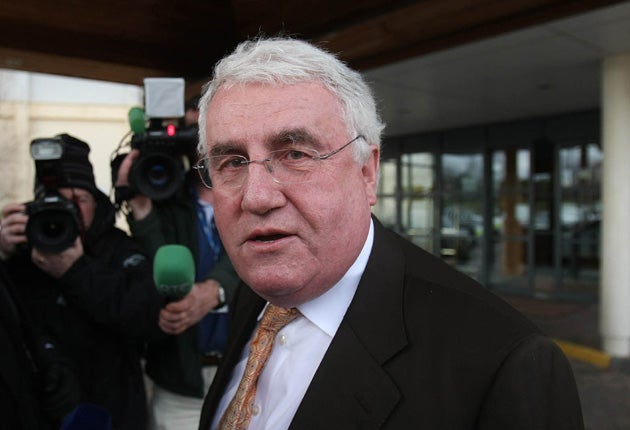Don't panic, say the Irish - but Europe is getting nervous

Ireland's European partners are urging the debt-stricken nation to seek immediate assistance from an international rescue fund to resolve its financial problems and avoid a repeat of the Greek sovereign debt crisis that almost destroyed the euro earlier this year.
The warnings, led from Portugal and Spain, come as Irish government officials admit that they have been engaged in high-level contacts with Brussels about tapping the €500bn European Financial Stability Fund, backed by the EU and the International Monetary Fund. Irish Finance Minister Brian Lenihan will meet his European counterparts today and tomorrow. Mr Lenihan continues to stand by a denial that any formal application for emergency assistance has been made.
But more preliminary discussions seem to have taken place and there is also speculation that the government may seek money for its banks rather than itself. Given that the Irish government has issued a blanket guarantee to creditors, including bondholders, of its busted banks, that in practice amounts to the same thing.
Of the nations most at risk from contagion, Portugal has the greatest cause to close down the latest wave of instability before it turns into panic. The country's Finance Minister, Fernando Teixeira dos Santos, warned that "the risk is high because we are not facing only a national or country problem. It is the problems of Greece, Portugal and Ireland. This is not a problem of only this country... This has to do with the eurozone and the stability of the eurozone, and that is why contagion in this framework is more likely."
The Portuguese minister added: "Markets look at these economies together because we are all in this together in the eurozone, but probably they could look different if we were not in the eurozone."
The Governor of the Bank of Spain Miguel Angel Fernandez Ordonez also blamed Ireland for dithering: "The situation in the markets has been negative due in some part to the lack of a decision by Ireland," he said. "It's not up to me to make a decision on Ireland; Ireland should take the decision at the right moment."
"We have no reason whatsoever why Ireland should seek external support. Ireland is well-funded," said Ireland's Minister for European Affairs, Dick Roche. Meanwhile the leader of the opposition, Michael Noonan of Fine Gael, confirmed that other European governments were determined to intervene soon to contain Ireland's difficulties. "I think the Irish government are fighting a rearguard action for appearance's purposes, but I believe that things will come to head in the next 24 hours," he said.
International investors have been demanding large "risk premiums" to take on government debt from Dublin and Lisbon, with interest rates on typical government securities approaching 10 per cent, compared with nearer 3 per cent on German bonds. Yields on all eurozone government debts should be similar. The premiums signal that the markets believe there is a high possibility of default in a "debt restructuring". Such risks are not supposed to affect the European single currency.
The latest crisis was prompted, ironically, by the leader of the nation that will have to foot the lion's share of any bill for a bailout, Chancellor Angela Merkel of Germany. She hinted last week that she felt the holders of Irish government or bank debt ought to be expected to share the pain of any bailout, and accept some loss of capital. Though EU finance ministers attending the G20 Summit in Seoul quickly denied that that was the official policy of the EU, Ms Merkel's words sent confidence in Irish and Portuguese government debt plummeting.
Ireland's borrowing this year – as a result of costs associated with its most broken bank, Anglo Irish – will hit 32 per cent of GDP, against about 12 per cent in the UK. Ireland's national debt will soon top 100 per cent of her national income, about half as much again as the peak expected for Britain and a level many economists believe will be too large to service, even with further austerity measures expected in the 7 December budget.
The problem the Irish government faces is that anything it does to try to meet its obligations becomes counterproductive; cutting public workers' salaries and chopping services merely pushes unemployment higher, income tax revenues lower and makes the banks' bad debts worse.
Raising corporation taxes and abolishing investment allowances to cut state borrowing may also kill the foreign investment that powered the former Celtic Tiger. Even an IMF/EU rescue package might run into similar difficulties.
Subscribe to Independent Premium to bookmark this article
Want to bookmark your favourite articles and stories to read or reference later? Start your Independent Premium subscription today.

Join our commenting forum
Join thought-provoking conversations, follow other Independent readers and see their replies